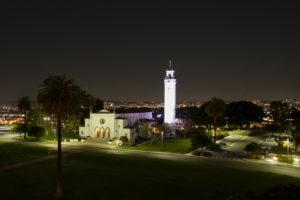
Linda C. Tillman, Ph.D., professor emerita of educational leadership at the School of Education at the University of North Carolina at Chapel Hill, is a nationally recognized scholar and leader in higher education and a celebrated scholar in diversity, equity, and inclusion (DEI) issues in educational leadership. Her research and scholarship are focused in school leadership; the education of all children and particularly African Americans in K-12 education; and culturally appropriate research approaches. She is the editor or co-editor of several volumes on educational leadership, research methods, and leadership for equity and diversity.
Professor Tillman has joined the LMU School of Education as a Distinguished Visiting Faulty in the doctoral program this fall. She is presenting an open lecture titled “And Still We Rise,” on DEI issues, on Sept. 28, 2021.
LMU This Week: Mentoring, formal and informal, is a focus of much of your writing; what is it about that practice that is so valuable to educators?
Linda Tillman: Based on my experience as an African American female professor, I believe that mentoring has been absolutely critical to my success. I was a high school educator and when I switched careers to become a faculty member, I had very little experience with the norms, the written and unwritten rules of the academy, and most importantly, with writing for publication. I was able to overcome those challenges because of the committed, consistent, and long-term mentoring that I received from faculty members across the country. The landscape, the rules, and the socialization to the academy is usually very different for African Americans than it is for their white peers. There is an assumption that white faculty belong in the academy, deserve to earn promotion and tenure and promotion to full professor, and deserve to be labeled “successful,” or labeled a “leading scholar” and referred to in other positive terms. This is not the norm for African American faculty.
It is often the case that African American faculty walk into an unwelcoming environment, receive constant negative criticism, are overloaded with service (particularly when it comes to mentoring African American students), and have a more difficult time earning promotion and tenure or promotion to full professor. Thus, I believe that mentoring can be one of the keys to the success of African American and other faculty of color — their recruitment, hiring and retention all are very much dependent on the quality and scope of the mentoring they receive. While it is not impossible to be successful without a mentor, having a mentor gives a mentee on a tremendous advantage. The mentor acts as a guide/confidant who helps the untenured, inexperienced faculty member with career as well as social/emotional support and helps the mentee to develop a strategy for meeting all of the mandatory requirements of the academy, as well as the goals that the mentee has set for him/herself. Mentoring is definitely one of the keys to a more diverse faculty.
LMUTW: You’ve written about the sense of isolation that underserved populations often experience at predominantly white institutions; are there methods to teach educators on how to identify it in individuals and on the institutional level so they might break through that isolation?
LT: I’m not sure that there are particular “methods” that teach educators to identify those persons who are experiencing “isolation” in their departments and colleges. Rather, I believe that it is the environment and culture of departments and colleges that should be monitored and addressed with respect to this issue. It is probably the case that non-white faculty rarely openly express their frustrations with being isolated from their colleagues, being isolated from information that could help advance their career, being isolated from other faculty of color, and being treated as “different” in negative ways. Being a professor is, for the most part, very individualistic. So, it is not the case that all professors are in constant contact with their colleagues. This can be problematic when a person is the only African American, the only Latinx, the only Asian, the only Indigenous scholar in the department or the college.
That fact that a faculty member is the “only” person of color or one of a few faculty of color in a department or college should cause the administration to at least seek out the faculty member and inquire about how he/she might be feeling in terms of their comfort level. I think rather than using a “method”, deans, associate deans, and chairs can make an effort to identify mentors of color in other departments, universities, and professional organizations who may be willing to work with their faculty of color and provide them with some same-race affiliation. A great deal has been written about this as well as other issues for faculty of color. In particular, Inside Higher Ed published a report titled “The Black Experience in Higher Education” (October, 2020). The report is an eight-part series that gives readers insight into the experiences of Blacks in higher education during and after the murder of George Floyd and the Black Lives Matter protests. Similar articles in Inside Higher Ed have addressed isolation and lack of support structures for other under-represented groups.
LMUTW: Do you think that the prolonged pandemic presents complications for culturally informed research?
LT: On the contrary, I think the pandemic has opened up a number of possibilities for culturally informed research. African Americans and other people of color have been disproportionately impacted by COVID-19 in terms of the number of cases, deaths, access to treatment, access to the vaccine, access to the internet, online learning, etc. Recently, the Black Education Research Collective, which is located at Teachers College-Columbia University, conducted a study of the impact of the pandemic on the education of Blacks. The report is titled “Black Education in the Wake of COVID-19 and Systemic Racism: Toward a Theory of Change & Action.” The research was conducted using my Culturally Sensitive Research Framework (2002). Interviews were conducted with Black parents, teachers, and students, as well as education and community leaders. So yes, there are still many opportunities to use culturally informed research methods to conduct research that can benefit schools and communities. There are so many questions that need to be asked and answered about the pandemic and its relation to the current racial climate in the United States.
LMUTW: Do you have any preliminary or introductory insights for the Ed.D. candidates on bridging ethnic culture (theirs or their students’) and the university culture?
LT: As I have mentioned in several of my interactions with faculty, staff and students at LMU, this will be my first experience working with individuals who are not white or African American. So, in addition to the Ed.D. students bridging cultures, I too will have to learn about other cultures and the role of the university in recognizing and accepting diverse cultures. So, I’ll have to get back to you on my thinking how both students and I learn about how to bridge cultures with the university culture.
LMUTW: In the ongoing work of diversity, equity, and inclusion, what gives you encouragement? What signs of hope do you see?
LT: Well, I’m hoping that hearts and minds will be changed so that diversity, equity, and inclusion will be the rule rather than the exception or an “add on.” And I’m hoping that people will be resilient and be able to overcome the pervasiveness and persistence of racism. We are living in such a negative culture with so much hate, and racism and hate seem to be winning. So, I’m hoping that the push for diversity, equity and inclusion continues and that there are positive outcomes from the numerous initiatives we see in education and business.




